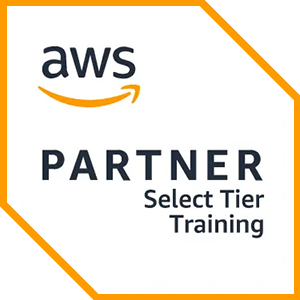Python is an object oriented rapid development language deployed in many scenarios in the modern world.
This Python Programming 1 course is designed to give delegates the knowledge to develop and maintain Python scripts using the current version (V3) of Python.
There are many similarities between Python V2 and Python V3. The skills gained on this course will allow the delegate to develop their own skills further using Python V2 or V3 to support the development and maintenance of scripts.
The Python Programming 1 course comprises sessions dealing with syntax, variables and data types, operators and expressions, conditions and loops, functions, objects, collections, modules and packages, strings, pattern matching, dates, exception handling, files, and databases.
Exercises and examples are used throughout the course to give practical hands-on experience with the techniques covered.
This course aims to provide the delegate with the knowledge to be able to produce Python scripts and applications that exploit all core elements of the language including variables, expressions, selection and iteration, functions, objects, collections, strings, modules, pattern matching, exception handling, I/O, and classes.
The delegate will learn and acquire skills as follows:
- Writing and testing simple scripts
- Representing data using built-in and custom data types
- Building expressions
- Building conditional and iterative statements
- Declaring and calling functions
- Using objects
- Creating and manipulating collections including lists, tuples, and dictionaries
- Creating and manipulating strings
- Creating modules and packages, and using third-party libraries
- Pattern matching
- Working with date and time objects
- Handling exceptions
- Reading from and writing to files and databases
- Coding in an OOP manner
Day 1
Course Introduction
- Administration and Course Materials
- Course Structure and Agenda
- Delegate and Trainer Introductions
Session 1: GETTING STARTED
- About Python
- Python versions
- Python documentation
- Python runtimes
- Installing Python
- The REPL shell
- Python editors
Session 2: PYTHON SCRIPTS & SYNTAX
- Script naming
- Comments
- Docstring
- Statements
- The backslash
- Code blocks
- Whitespace
- Console IO (to enable the writing of simple programs)
- A first Python program
- Script execution
Session 3: VARIABLES & DATA TYPES
- Literals
- Identifiers
- Assignment
- Numbers (bool, int, float, complex)
- Binary, octal, and hexadecimal numbers
- Collections (str, list, tuple, set, dict)
- None
- Implicit and explicit type conversion (casting)
- The type function
Session 4: OPERATORS & EXPRESSIONS
- Arithmetic Operators
- Assignment Operators
- Comparison Operators
- Logical Operators
- Membership Operators
- Bitwise Operators
- Identity Operators
Session 5: CONDITIONS & LOOPS
- Conditional statements (if, elif, else)
- Short hand if/if else
- Python’s alternative to the ternary operator
- Iterative statements (while, for, else)
- The range function
- Iterating over a list
- Break
- Continue
- Nested conditional/iterative statements
Day 2
Session 6: FUNCTIONS
- Declaration
- Invocation
- Default values for parameters
- Named arguments
- args and kwargs
- Returning multiple values
- Nested functions
- Functions as data
- Introduction to lambda expressions
- Variable scope
- The pass keyword
Session 7: OBJECTS AND CLASSES
- About objects
- Attributes and the dot notation
- The dir function
- Dunder attributes
- Mutability
- The id function
- Pass by reference
- Introduction to Classes
- Class Declaration and Instantiation
- Data attributes
- Methods
- Composition
Session 8: LISTS
- About lists
- List syntax including slicing
- Getting and setting list elements
- Iterating over a list
- Checking for the presence of a value
- The len function
- List methods incl. append, insert, remove, pop, clear, copy, sort, reverse etc.
- The del keyword
- Appending to and combining lists
- List comprehension
Session 9: TUPLES
- About tuples
- Tuple syntax
- Getting tuple elements including unpacking
- Iterating over a tuple
- Checking for the presence of a value
- The len function
- Appending to and combining tuples
Session 10: SETS
- About Sets
- Dictionary syntax
- Creating, adding and removing set elements
- Iterating over a set
- Membership Testing
- Sorting
- Copying
- Set methods incl. union, intersection, difference, symmetric_difference etc.
Day 3
Session 11: DICTIONARIES
- About dictionaries
- Dictionary syntax
- Getting and setting dictionary elements
- Iterating over a dictionary (keys, values, and items)
- Checking for the presence of a key
- The len function
- Dictionary methods incl. keys, values, items, get, pop, popitem, clear etc.
- The del keyword
- Dictionary comprehension
Session 12: STRINGS
- About strings
- String syntax including slicing
- Escape characters
- Triple-quoted strings
- Concatenation
- Placeholders
- The format method
- Other methods e.g. endswith, find, join, lower, replace, split, startswith, strip, upper etc.
- A string as a list of bytes
Session 13: MODULES & PACKAGES
- About modules
- The module search path
- Importing modules
- Namespaces
- Importing module objects
- The import wildcard
- Aliases
- Importing within a function
- Executable modules
- Reloading a module
- About packages
- Importing packaged modules
- Importing packaged module objects
- Package initialisation
- Subpackages
- Referencing objects in sibling packages
- The Standard Library
- Installing modules and packages using pip
Session 14: PATTERN MATCHING
- About regular expressions
- Regular expression special characters
- Raw strings
- About the re module
- re module functions incl. match, search, findall, full match, split, sub
Day 4
Session 15: DATES
- About the datetime module
- datetime object attributes
- Creating a datetime object
- Date arithmetic
- Formatting dates
Session 16: EXCEPTION HANDLING
- About exceptions and exception handling
- Handling exceptions (try, except, else, finally)
- Exception types
- The exception object
- Raising exceptions
- Custom exception types
Session 17: FILES & THE FILESYSTEM
- The open function
- Methods for seeking (seekable, seek)
- Methods for reading from a file (readable, read, readline, readlines)
- Iterating over a file
- Methods for writing to a file (writable, write, writelines)
- Introduction to context managers
- File parsing for files of type CSV, XML, JSON, YAML
- About the os module
- os module functions incl. getcwd, listdir, mkdir, chdir, remove, rmdir etc.
- Session 18: DATABASES
- The DB-API
- DP-API implementations
- Establishing a connection
- Creating a cursor
- Executing a query
- Fetching results
- Transactions
- Inserting, updating, and deleting records
The Python Programming 1 course is aimed at anyone who wants to learn Python as a first language, and developers/engineers who want to migrate to Python from another language, particularly those with little or no object-oriented knowledge.
Students attending this course should be able to define general programming concepts including compilation and execution, variables, arrays, sequence, selection and iteration, navigate the filesystem (on the command line ideally), edit and save text files and browse the web.




































 United Kingdom
United Kingdom Germany
Germany Denmark
Denmark Norway
Norway Italy
Italy Netherlands
Netherlands Finland
Finland










 Duration
Duration
 Delivery
Delivery  Price
Price